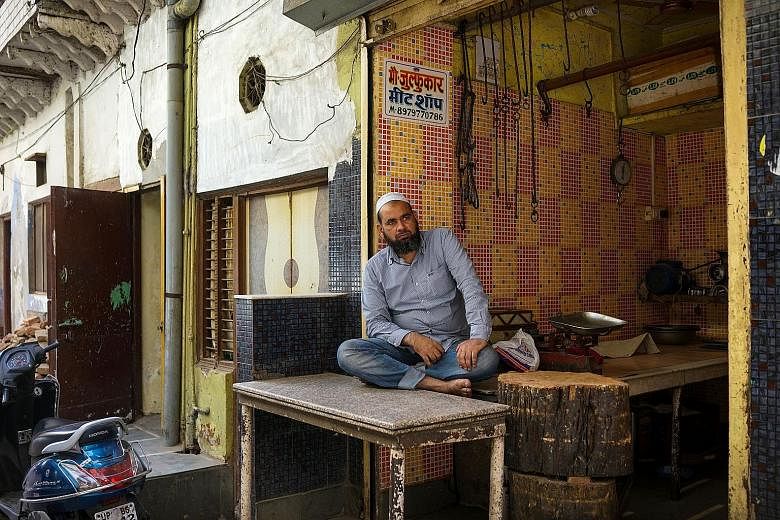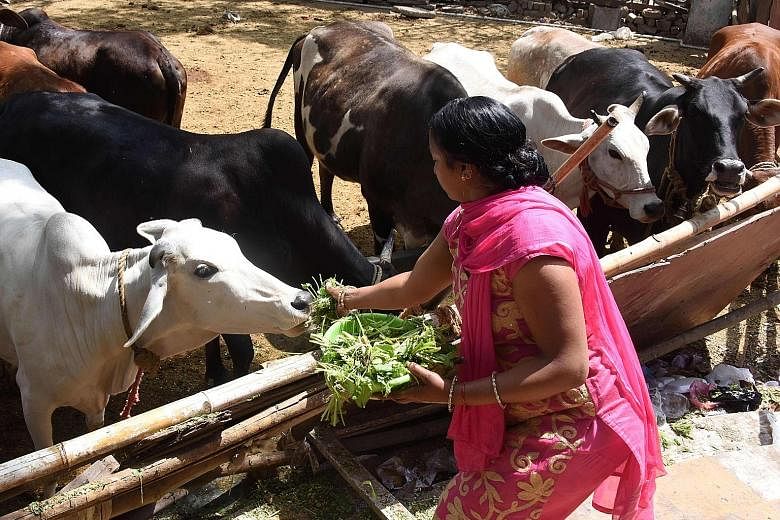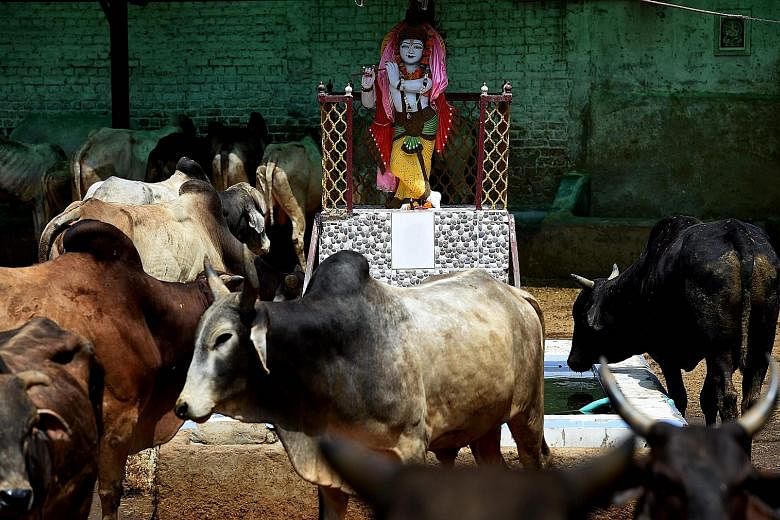Mr Pawan Pandit sees himself as a soldier at war. His "enemy", he said, is within the country and includes anyone who eats beef or slaughters cows.
Mr Pandit, 33, is the head of the Bharatiya Gau Raksha Dal (Indian cow protection organisation), a federation of cow vigilante groups of more than 1,000 members.
"A Gau Rakshak's (cow protector's) life and the life of an army man working on the border is equal. We also work on the (state) borders. They fight against enemies outside the country and we fight enemies within," said Mr Pandit, sipping orange juice in his office in the Sahibabad Industrial Area, in the state of Uttar Pradesh.
It may be hard to believe, but the placid, grass-chewing bovine is at the centre of the most polarising issue in India now - controversy over the eating of beef and slaughter of cows. At least half a dozen Muslims, who are seen to dominate the meat trade, have been killed over the past two years, reportedly by cow vigilantes.
On Sunday, two men were lynched to death by a mob in North-eastern Assam state for allegedly trying to steal cows from the local grazing reserve.
-
$5.6b Value of India's annual beef exports. The industry employs 2.5 million people, with more than 60 per cent of the exports coming from the state of Uttar Pradesh.
$437m The amount which the beef industry is estimated to lose due to the crackdown on cattle slaughterhouses in Uttar Pradesh.
Currently, the slaughter of cows is banned in 21 out of 29 Indian states. The exceptions are Kerala, West Bengal and the north-eastern states of Arunachal Pradesh, Mizoram, Meghalaya, Nagaland, Sikkim and Tripura, where beef is eaten.
While most Indians do not eat beef, Mr Pandit insists cow smuggling is a serious problem in India. There are no statistics on the issue.
Hindus, who comprise 79.8 per cent of India's population, mostly revere cows and do not eat beef. For Hindus, cows provide not only milk and ghee (clarified butter) but also cow dung, which is used as a fertiliser and fuel in rural areas.
But some Muslims, Christians and even Hindus consume beef, which is usually the cheapest red meat available in India because it is not in high demand.
India tied with Brazil as the world's top exporter of beef last year; India annually exports about US$4 billion (S$5.6 billion) worth of meat from water buffaloes - a member of the bovine family classified as beef by the United States Department of Agriculture.
Mr Pandit and his colleagues would also like to see India stop exporting buffalo meat but, as a compromise, are focused on stopping cow slaughter and have called for a countrywide ban. His group conducts raids, has a network of informers and stops trucks to check that they are not carrying cows. Its ultimate aim is turn India vegetarian.
Mr Pandit maintains that the group operates in conjunction with the police amid rising criticism against the vigilante groups and their extreme views. "The person who eats beef is a Rakshas (monster) and has no humanity," he said.
In Uttar Pradesh, India's most populous and poorest state, new Chief Minister Yogi Adityanath, a hardline Hindu nationalist known for fiery rhetoric, has brought "cow politics" squarely to the forefront. One of his first moves after being sworn in was to announce a crackdown on illegal slaughterhouses - a measure, he said, to protect cows.
The order caused chaos.
There were reports that even legitimate slaughterhouses and meat shops were being shut down on technicalities, resulting in a shortage of all kinds of meat in Uttar Pradesh and beyond.
While the Uttar Pradesh government said it was just enforcing existing laws, the impact of the crackdown is being felt far and wide.
The beef export industry employs 2.5 million people, with more than 60 per cent of the exports coming from Uttar Pradesh. Beef exports are likely to be hit, with some estimating that the losses could amount to 20 billion rupees (S$437 million).
Elsewhere, the leather industry, which employs some 2.5 million workers alone, is running at 40 per cent below capacity because of the shortage of raw material normally sourced from abattoirs.
Mr Mukhtarul Amin, chairman of the Council for Leather Export, who declined to put a figure on the losses being incurred, confirmed that there is a raw material shortage currently.
He said: "But we are very sure that in the next six months, things will be better. At the moment, because of a shortage, we are paying higher prices and running at under capacity."
According to Human Rights Watch, at least 10 Muslims have been killed in vigilante action since May 2015. While Muslims are perceived to dominate the beef trade, the Dalits, Hindus who were formerly known as "the untouchables", are also involved in the skinning of cattle for the leather trade. They have also been at the receiving end of the cow vigilante groups.
On April 1, suspected cow vigilantes attacked 15 Muslim men for transporting cows in Rajasthan state. Mr Pehlu Khan, a 35-year-old dairy farmer, died from the injuries suffered during the attack
In March, cow vigilantes beat up a hotel manager on the suspicion that beef had been served.
Last year, four Dalit men were tied to a car and beaten because they were suspected of slaughtering cows in Gujarat.
Some cow vigilantes have been arrested in these instances, but the court cases are still ongoing. In a number of cases, the victims were also robbed by the vigilantes.
While Prime Minister Narendra Modi has criticised the vigilante groups and called for a crackdown on them, the cow vigilantes are seen to have been emboldened as the ruling Bharatiya Janata Party (BJP) has moved to tighten existing rules banning cow slaughter at the state level.
In 2015, Haryana, a state ruled by the BJP, banned the sale of beef in any form and proposed 10 years' jail for cow slaughter.
Maharashtra this year banned slaughter of all cattle, including bulls and bullocks, and the transport of cattle out of the state.
And Gujarat, which is going to the polls in the coming months, recently amended its law to increase the punishment for those found guilty of killing bulls and cows from seven years to life imprisonment as the maximum sentence. It also raised the punishment for transporting cows from three to 10 years.
The latest government proposal is to give identification numbers to cows in India even as the Supreme Court looks into whether cow protection groups should be shut down.
Critics believe cow vigilante groups, with their roots in Hindu nationalism, have been targeting the Muslim community.
"Does all this mean India is going to turn into a vegetarian state? Someone who spoke so much on cow slaughter like Gandhi himself said it is a cultural issue," said social activist Nikhil Dey. "One section cannot decide what the other section can and cannot eat. There is also a political element to it."
The protection of cows is also seen as a political issue used by the BJP to garner votes from its Hindu voters in state and parliamentary elections. The BJP has made protecting the cow an issue even in civic polls in Delhi, which it won.
Despite the focus on their protection, cows can still be seen wandering on roads in Indian cities. This is because once a cow stops giving milk, many farmers and owners are known to just release it on the streets as they can do little else with the animal.
The cows on the streets obstruct traffic and often eat food wrapped up in plastic bags - which is fatal.
Some Hindu families would save leftover chapatti, or bread, to feed the cows on the streets.
At the Maharishi Dayanand Gosamvardan Kendra Gaushala, a cow shelter, hundreds of cows - some bought, others rescued from the streets - are chained in a row.
Far from the controversies, well- dressed people drive into the cow shelter and buy feed for the cows, which is considered a good deed.
Businessman Pankaj Aggarwal and his wife Pallavi, a housewife, visit twice a month to feed the cows, which they consider an auspicious task.
"We do it as our duty," said Mr Aggarwal, while feeding the cows. "The violence is very wrong, but cow protection should definitely be there."




